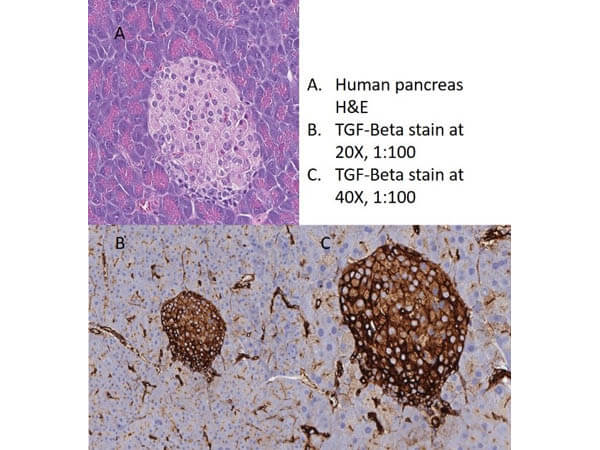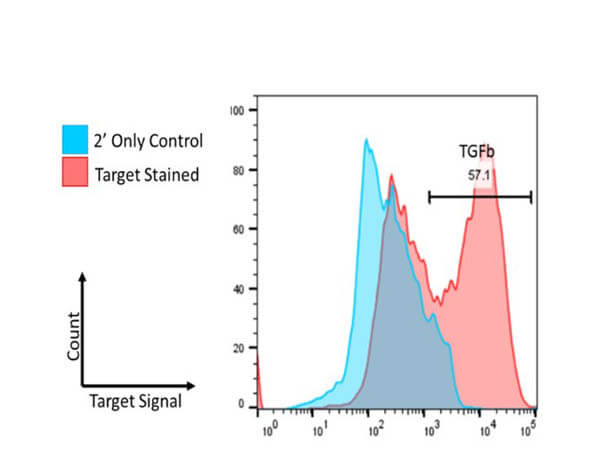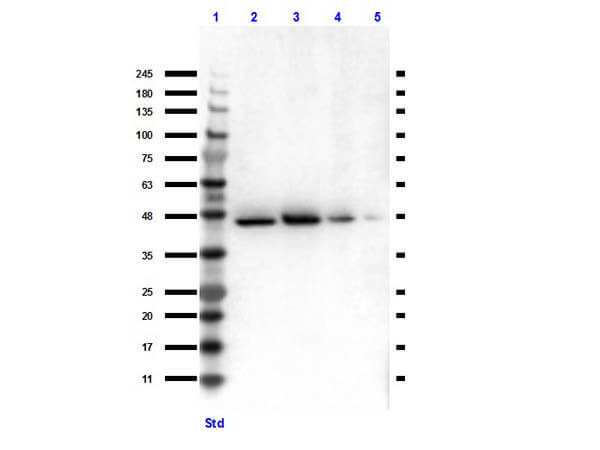Datasheet is currently unavailable. Try again or CONTACT US
TGF beta Receptor 1 Antibody
Rabbit Polyclonal
600-401-MG6S
600-401-MG6
25 µL
100 µg
Liquid (sterile filtered)
Liquid (sterile filtered)
WB, ELISA, IHC, FC
Human, Mouse
Rabbit
Shipping info:
$50.00 to US & $70.00 to Canada for most products. Final costs are calculated at checkout.
Product Details
Anti-TGF beta Receptor 1 (RABBIT) Antibody - 600-401-MG6
Rabbit Anti-TGF-Beta Receptor Type-1 Antibody, TGF-Beta Receptor Type I, TGF-Beta Type I Receptor, Transforming Growth Factor Beta Receptor 1,Transforming Growth Factor-Beta Receptor Type I, Serine/Threonine-Protein Kinase Receptor R4, Activin A Receptor Type II-Like Kinase, 53kDa, Activin Receptor-Like Kinase 5, TbetaR-I, TGFR-1, ALK-5, ALK5, SKR4, TBR-I
Rabbit
Polyclonal
IgG
Target Details
TGFBR1 - View All TGFBR1 Products
Human, Mouse
Conjugated Peptide
Anti-TGF beta receptor 1 antibody was prepared from whole rabbit serum produced by repeated immunizations with a synthetic peptide corresponding to an extracellular portion of human TGF beta receptor 1 conjugated to Keyhole Limpet Hemocyanin (KLH).
This affinity purified antibody is directed against human TGF beta receptor type-1 protein. The product was affinity purified from monospecific antiserum by immunoaffinity chromatography. A BLAST analysis was used to suggest cross-reactivity with the antigen based on 100% homology with the immunizing sequence to mouse, rat, bovine, and wild boar. Cross-reactivity is expected with TGFb1 from non-mammalian sources as only a single amino acid residue change is found within the immunogen sequence from many other organisms.
Application Details
ELISA, FC, IHC, WB
Anti-TGF beta Receptor 1 Antibody has been tested in ELISA, WB, IHC, and FLOW. Expect a band at ~47.7 kDa in western blot using appropriate lysates. Positive control used: TGFB1 overexpressed lysate, HEK, HeLa, or Mouse Liver in WB; Hu pancreas in IHC; MCF7 cells FLOW.
Formulation
1.0 mg/ml by UV absorbance at 280 nm
0.02 M Potassium Phosphate, 0.15 M Sodium Chloride, pH 7.2
0.01% (w/v) Sodium Azide
None
Shipping & Handling
Dry Ice
Store vial at -20° C prior to opening. Aliquot contents and freeze at -20° C or below for extended storage. Avoid cycles of freezing and thawing. Centrifuge product if not completely clear after standing at room temperature. This product is stable for several weeks at 4° C as an undiluted liquid. Dilute only prior to immediate use.
Expiration date is one (1) year from date of receipt.
The transforming growth factor-beta family of polypeptides (TGF-beta1-3) are involved in the regulation of cellular processes, including division, differentiation, motility, adhesion and death. TGF-beta signals by binding the type II receptor (TGF-betaRII) which activates the type I receptor (TGF-betaRI). Transmembrane serine/threonine kinase forming with the TGF-beta type II serine/threonine kinase receptor, TGFBR2, the non-promiscuous receptor for the TGF-beta cytokines TGFB1, TGFB2 and TGFB3. Transduces the TGFB1, TGFB2 and TGFB3 signal from the cell surface to the cytoplasm and is thus regulating a plethora of physiological and pathological processes including cell cycle arrest in epithelial and hematopoietic cells, control of mesenchymal cell proliferation and differentiation, wound healing, extracellular matrix production, immunosuppression and carcinogenesis. The formation of the receptor complex composed of 2 TGFBR1 and 2 TGFBR2 molecules symmetrically bound to the cytokine dimer results in the phosphorylation and the activation of TGFBR1 by the constitutively active TGFBR2. Activated TGFBR1 phosphorylates SMAD2 which dissociates from the receptor and interacts with SMAD4. The SMAD2-SMAD4 complex is subsequently translocated to the nucleus where it modulates the transcription of the TGF-beta-regulated genes. This constitutes the canonical SMAD-dependent TGF-beta signaling cascade. Also involved in non-canonical, SMAD-independent TGF-beta signaling pathways. For instance, TGFBR1 induces TRAF6 autoubiquitination which in turn results in MAP3K7 ubiquitination and activation to trigger apoptosis. Also regulates epithelial to mesenchymal transition through a SMAD-independent signaling pathway through PARD6A phosphorylation and activation. Mutations in this gene have been associated with Loeys-Dietz aortic aneurysm syndrome (LDAS). Anti-TGF beta receptor 1 Antibody is useful for researchers interested in skin cancer research, cardiac research, and mTOR Pathway and p38 MAPK Signaling Pathways.
This product is for research use only and is not intended for therapeutic or diagnostic applications. Please contact a technical service representative for more information. All products of animal origin manufactured by Rockland Immunochemicals are derived from starting materials of North American origin. Collection was performed in United States Department of Agriculture (USDA) inspected facilities and all materials have been inspected and certified to be free of disease and suitable for exportation. All properties listed are typical characteristics and are not specifications. All suggestions and data are offered in good faith but without guarantee as conditions and methods of use of our products are beyond our control. All claims must be made within 30 days following the date of delivery. The prospective user must determine the suitability of our materials before adopting them on a commercial scale. Suggested uses of our products are not recommendations to use our products in violation of any patent or as a license under any patent of Rockland Immunochemicals, Inc. If you require a commercial license to use this material and do not have one, then return this material, unopened to: Rockland Inc., P.O. BOX 5199, Limerick, Pennsylvania, USA.



